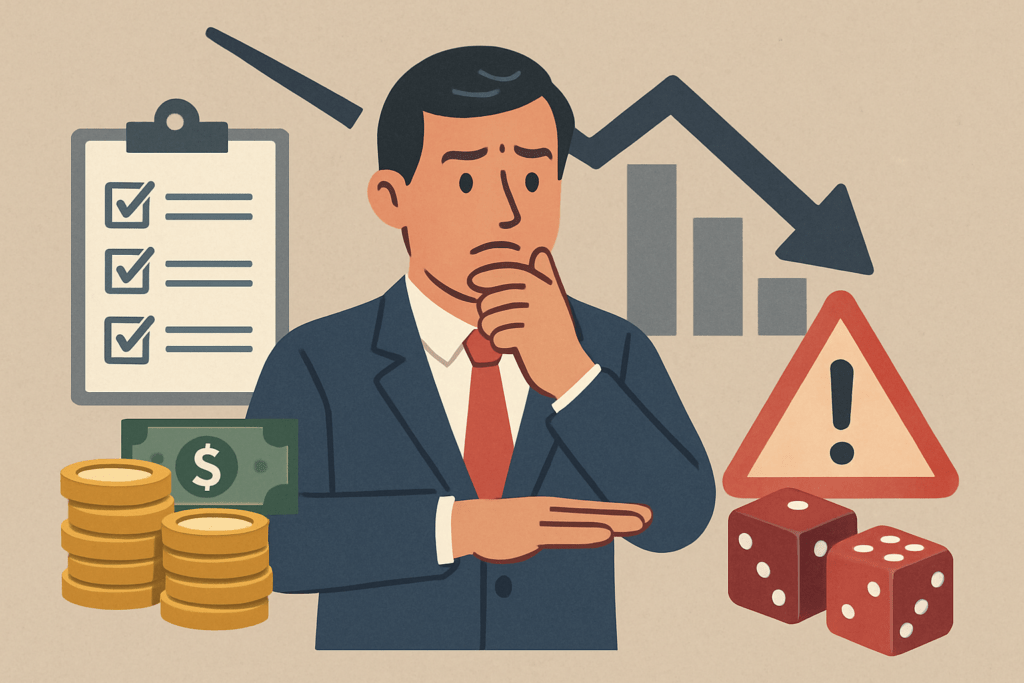Managing Betting Risks: Why It’s Smarter Than You Think
- Start with the honest truth—every bet carries risk, but how you manage those risks makes all the difference.
- Introduce the core idea: responsible gambling is about control, not luck.
- Use the primary keyword early: managing betting risks.
What Happens After Winning Millions?
Winning a life-changing lottery jackpot is every player’s dream, but few are prepared for what comes next. The sudden influx of wealth can bring excitement, but also a wave of challenges. Many winners find themselves overwhelmed by financial decisions, from managing taxes to making smart investments. Some handle it well, while others struggle with reckless spending that drains their fortune faster than expected.
The Financial Reality of Winning
Many winners face critical financial decisions almost immediately:
- Taxes and Legal Issues: A large chunk of the winnings often goes to taxes, and failing to plan can lead to legal troubles.
- Investing vs. Spending: Some winners hire financial advisors to ensure long-term security, while others spend impulsively without a plan.
- Budgeting for the Future: Without proper money management, even the biggest jackpots can disappear quickly.
A Lifestyle Overhaul
A sudden fortune changes life in more ways than one:
- Luxury Purchases: Mansions, sports cars, and extravagant vacations become instantly affordable.
- Social Pressure: Long-lost friends and distant relatives often reappear, expecting a share of the winnings.
- Privacy Challenges: Some winners struggle with unwanted media attention and public scrutiny.
While some winners embrace their new wealth openly, others choose to live discreetly to avoid pressure and attention.
Giving Back and Creating a Legacy
For some, wealth is not just about personal luxury—it’s an opportunity to make a difference. Many winners choose to:
- Donate to Charities and Community Projects
- Fund Scholarships or Support Education Initiatives
- Invest in Businesses that Create Jobs and Opportunities
Some lottery winners go from players to philanthropists, proving that wealth can be used to leave a lasting impact. However, not all stories end positively—many who fail to manage their winnings properly find themselves bankrupt within years.
The Basics: What Managing Betting Risks Really Means
Let’s not sugarcoat it: when you place a bet, you’re accepting that you could lose. That’s risk—no mystery, no loophole, just part of the game. But managing betting risks isn’t about denying that risk exists; it’s about handling it with your eyes open.
Think of it this way. “Risk elimination” is a myth—nobody, not even the sharpest pro, can guarantee a win every time. “Risk reduction,” though, is totally doable. Instead of pretending you can duck all danger, you focus on minimizing damage when luck isn’t on your side. You put the odds a little more in your favor, not by magic, but by making smarter, more disciplined calls.
Ultimately, there are three big goals here:
- Minimize losses—so the inevitable bad days don’t wipe you out.
- Maximize your control—you decide how much, when, and where you bet, not the other way around.
- Actually enjoy the process—because betting shouldn’t feel like walking a tightrope without a net.
Managing betting risks means leaning into what you can control and letting go of what you can’t. You won’t always win, but you can always play smarter.
Essential Betting Risk Control Techniques
1. Set and Stick to Your Limits
Let’s get real: winning streaks end, losing streaks hurt, and nobody’s got a crystal ball. That’s why the first rule of managing betting risks is brutally simple—set your limits before you place a single wager. Decide how much you’re willing to lose (and, if you’re on a roll, how much you’re happy to leave on the table as winnings) in advance. No exceptions, no “just one more” rationalizations.
This isn’t just about saving your bank account—it’s about saving your headspace. When you’ve got firm boundaries, you stop obsessing over what you can’t control and start focusing on making good decisions within your own guardrails. Fast tip: these limits aren’t just for your losses. Cap your wins for the session too, so you don’t ride a hot hand straight into oblivion. For more on how to actually build—and keep—those limits, check out our full breakdown on setting and sticking to your betting limits.
2. Bet Sizing: The Key to Surviving a Losing Streak
If your idea of “betting risk control” involves going all-in, congratulations—you’re destined for short-term excitement and long-term heartbreak. Real risk managers treat their bankroll like it’s got to last through the rainy season, not just a sunny afternoon.
Here’s the drill: decide on a flat percentage of your total bankroll for each bet. Maybe that’s 1%, maybe 5%, but never so much that a bad break wipes you out. Taking smaller bites keeps you in the game longer, and lets you ride out the cold spells without emotional meltdowns. It’s not sexy, but it works—slow and steady really does win here.
3. Diversification
Don’t saddle up on a single horse (unless you fancy heartbreak). Spread your bets over different games, leagues, or outcomes. Diversification isn’t just buzzword fluff—it really cushions your swings. When one market tanks, another might hit. It’s less stressful, more sustainable, and keeps your judgment from being clouded by one bad beat.
4. Know Your Markets and Odds
Blind bets are for suckers. The best kind of risk reduction comes from knowing what (and who) you’re betting on. Prioritize the sports, teams, or leagues you understand. Do the research—take the time to look at form, injuries, stats, whatever gives you that extra edge. If you can’t explain a market to a friend in plain words, you’ve got no business risking your money there. Stick to what you know, and you’ll make smarter calls with every wager.
1. Set and Stick to Your Limits
Let’s be blunt: if you can’t set limits, you’re not managing betting risks—you’re just flirting with chaos. Limits aren’t about being boring; they’re about survival and sanity. A “loss limit” is the line you refuse to cross, no matter how tempting it is to “win it all back.” A “win limit” is the number you hit, then walk away, even if you’re on a roll. Both are vital, and both require discipline that’s honestly tougher than crunching odds.
Why bother? Simple—limits stop emotions from running the show. With boundaries in place, tilt and desperation won’t smash your bankroll in one bad night. You’ll avoid the classic pitfall: chasing after a big loss or getting reckless after a big win. Setting limits turns betting into a controlled activity instead of a rollercoaster.
There’s also a psychological edge here. When you stick to your pre-set numbers, you’re training your brain: betting is just one part of your life, not the main event. This detachment is the real power move. For step-by-step help on picking smart limits and actually sticking to them, check out this guide: setting and sticking to your betting limits.
Bottom line, don’t trust luck—trust your own ability to set rules and follow them. That’s managing betting risks in its simplest, leanest form.
2. Bet Sizing: The Key to Surviving a Losing Streak
If you want to get serious about managing betting risks, nothing beats the discipline of smart bet sizing. Here’s how it works—never risk more than a small, standard percentage of your bankroll on any single bet. Pros usually hover between 1% and 5%. Why? Because streaks (good and bad) are inevitable. You need the ammo left to fight another day.
Look, going “all in” might feel bold, but it’s a shortcut to blowing up your account. If you keep stakes steady, losses are bumps rather than cliffs. This is the heart of solid betting risk control. Weathering cold runs is inevitable, but a measured approach—keeping your bet size fixed and modest—means one bad streak won’t wipe you out. It’s not flashy, but longevity isn’t about flashes; it’s about lasting through the grind. Play the long game.
3. Diversification
Don’t gamble like you’re putting all your chips on red. In managing betting risks, diversification is your armor. Instead of betting heavy on one game, one horse, or one parlay, spread your bets across different events or markets. Why? Because wagering on a single outcome is basically daring variance to wreck your bankroll. Losses sting less if your fortunes aren’t tied to just one ticket.
Think about it—sports are unpredictable, and even the “locks” lose sometimes. If you diversify, you’ve got a cushion. If your soccer bet bombs but your tennis or basketball punt comes through, you live to fight another day. Diversification means emotional swings are gentler, decision-making is sharper, and the stress? Way less. You’re not hoping for one miracle—just steady, small wins over time. That’s the real secret behind betting risk control.
What Happens After Winning Millions?
Winning a life-changing lottery jackpot is every player’s dream, but few are prepared for what comes next. The sudden influx of wealth can bring excitement, but also a wave of challenges. Many winners find themselves overwhelmed by financial decisions, from managing taxes to making smart investments. Some handle it well, while others struggle with reckless spending that drains their fortune faster than expected.
The Financial Reality of Winning
Many winners face critical financial decisions almost immediately:
- Taxes and Legal Issues
- A large chunk of the winnings often goes to taxes, and failing to plan can lead to legal troubles.
- Investing vs. Spending
- Some winners hire financial advisors to ensure long-term security, while others spend impulsively without a plan.
- Budgeting for the Future
- Without proper money management, even the biggest jackpots can disappear quickly.
A Lifestyle Overhaul
A sudden fortune changes life in more ways than one:
- Luxury Purchases
- Mansions, sports cars, and extravagant vacations become instantly affordable.
- Social Pressure
- Long-lost friends and distant relatives often reappear, expecting a share of the winnings.
- Privacy Challenges
- Some winners struggle with unwanted media attention and public scrutiny.
While some winners embrace their new wealth openly, others choose to live discreetly to avoid pressure and expectations.
Giving Back and Creating a Legacy
For some, wealth is not just about personal luxury—it’s an opportunity to make a difference. Many winners choose to:
- Donate to charities and community projects
- Fund scholarships or support education initiatives
- Invest in businesses that create jobs and opportunities
Some lottery winners go from players to philanthropists, proving that wealth can be used to leave a lasting impact. However, not all stories end positively—many who fail to manage their winnings properly find themselves bankrupt within years.
Safe Gambling Practices for Every Level
Here’s the truth: there’s no secret sauce, no silver bullet. The smartest bettors don’t just know what to bet on—they stick to the safest gambling practices, every time. Number one is self-control. Sounds simple, but pausing after a loss is tougher than it looks. Don’t chase. Chasing just piles bad decisions on top of bad luck, and things rarely get better from there.
Use the tech at your fingertips. Most platforms make it easy to set deposit limits, check your time spent, or even hit the nuclear option with self-exclusion tools. These aren’t just safety nets for beginners—veterans use them too, and there’s zero shame in that. Safe gambling practices also mean being honest with yourself about your habits. Feel tempted to up your bets after a bad streak? Take a break. Get perspective. Even five minutes can reset your head.
Bottom line, safe gambling is about putting sturdy guardrails on your fun. Anyone, at any level, can slip. Smart bettors anticipate the slide and stop it before it starts. Control isn’t optional—it’s the backbone of the whole game.
When to Walk Away (and Why It’s a Win)
Let’s call it straight—knowing when to walk away is one of the few sure wins in betting. It’s not just about losing streaks or empty wallets. Sometimes the warning signs are quieter: you’re placing bets to kill time, numb out stress, or nurse a bruised ego. That’s the moment to check yourself, because betting should never be a mood fix or an impulse purchase.
Everyone takes losses. It doesn’t mean you’re bad at betting or unlucky at life. It means you’re playing a game with risk, and sometimes, the right move is to fold your hand. Accepting losses—without chasing them—is the mark of a disciplined bettor. Make your exit a conscious choice, not a concession.
Here’s the real secret: leaving the table on your own terms is a win. It means you’re in charge, not your emotions or a string of bad beats. Respect that, and your bankroll—and enjoyment—will last a whole lot longer. Responsible exits aren’t defeat; they’re the ultimate sign of a winning mind.
Level Up: Advanced Approaches to Risk Management
Let’s be honest—if you’ve made it this far, you’re not just placing the occasional flutter. At this level, managing betting risks goes from “do your homework” to treating your wagers like a small business. Here’s where advanced risk control really kicks in.
First up: hedging, or “lay” betting. Think of this as insurance. Let’s say your pick is looking shaky midway through a tournament—you can place a bet against your own outcome to lock in a profit, or at the very least, cover your original stake. It’s not about playing it safe; it’s playing it smart. Don’t get blinded by loyalty to your first bet—the markets move, so should you.
Next, track your action like a bookkeeper. Every bet, every win, every loss—log it. Patterns will jump out: sports you crush, ones you bomb, emotional triggers that throw you off your plan. Self-review isn’t the sexiest part of gambling, but it’s the backbone of longevity. Honest tracking isn’t optional at this level; it’s survival.
Bottom line: advanced betting risk management is about staying nimble and brutally honest with yourself. You might not win every day, but you’ll give yourself a shot at lasting a lot longer than the average punter.
More Strategies and Expert Insights
Ready to dig deeper? Managing betting risks is an ongoing game of discipline and adaptation. For bettors willing to go beyond the basics, there’s a whole world of advanced techniques and expert wisdom out there. For example, some pros swear by techniques like value betting or arbitrage, both of which demand commitment to research and relentless self-analysis—not just blind faith in odds or gut feelings.
It pays (literally) to keep learning. Specialized risk management techniques can give you fresh angles and methods to sharpen your betting edge. The smartest bettors don’t get complacent; they stay curious, chasing better skills instead of chasing losses. So, stay hungry, stay critical, and always be a student of the game. The more you know, the better your chances—not just of winning, but of playing smarter and safer.
Conclusion: The Real Win Is Staying in Control
Here’s the bottom line: the smartest bettors aren’t luckier, they’re better managers. Managing betting risks isn’t about finding the perfect system, it’s about stacking the deck in your favor by playing smart and staying disciplined. Limit-chasing, emotional bets, and wishful thinking never last. Building a sustainable approach—one built on self-control, setting reasonable boundaries, and actually walking away when you should—is what keeps the best in the game long-term.
No one gets it right every time. But everyone can get better at minimizing losses and maximizing control. Start with discipline, lean into proven strategies, and avoid the traps that lead to regret. In the end, responsible gambling isn’t a boring fallback—it’s the real edge. That’s how you outlast your luck and turn playing the odds into something you actually enjoy. That’s the win.

































































































































































































































































































































































































































